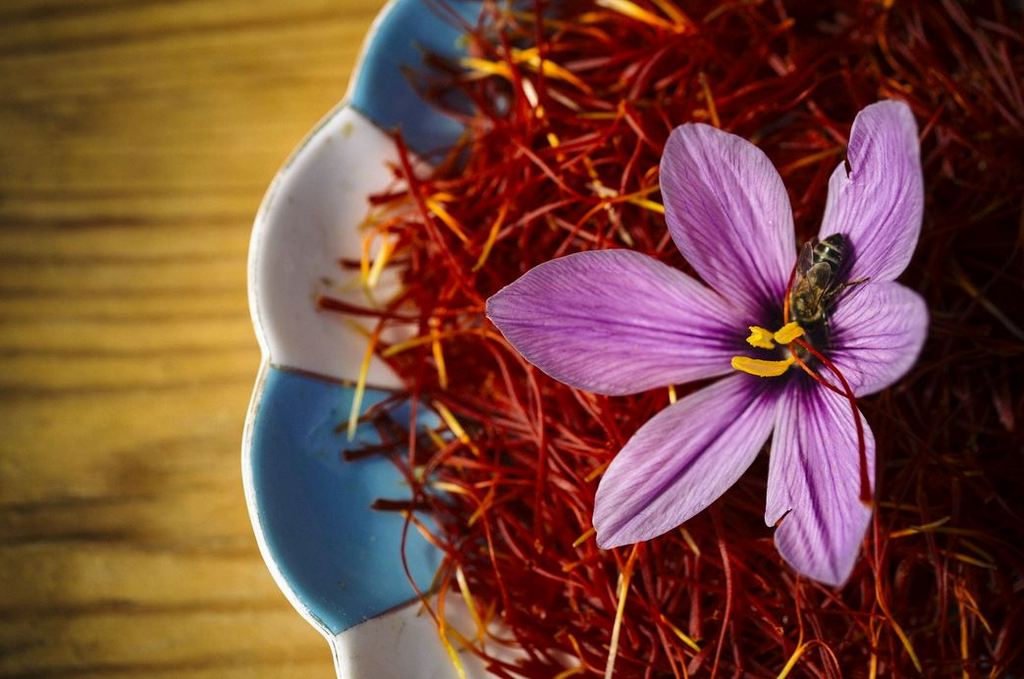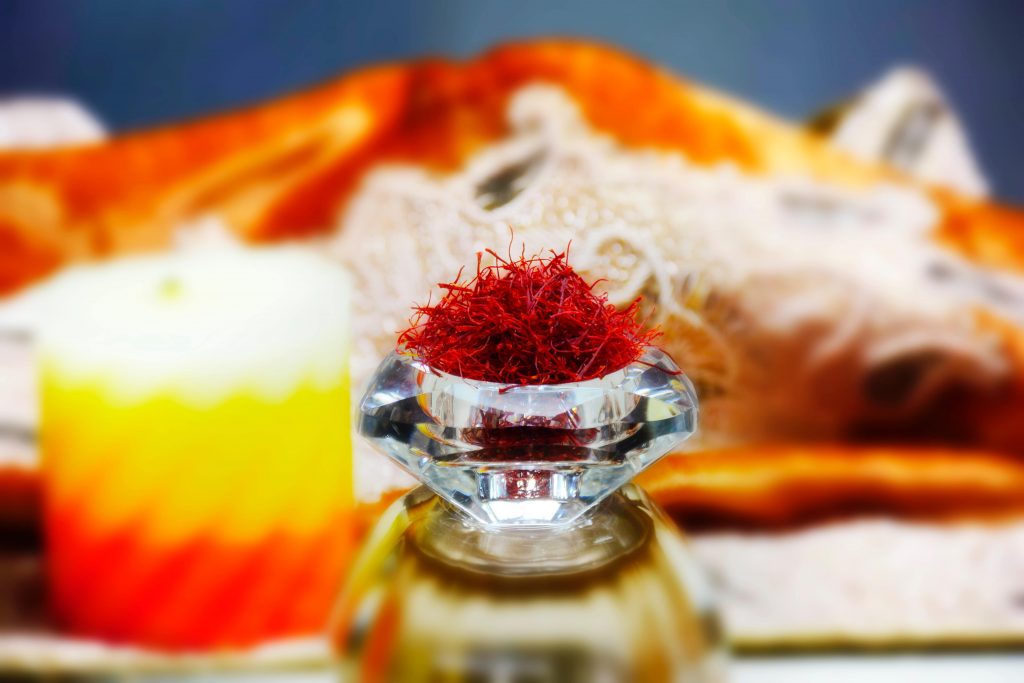Saffron properties
- saffron
- Saffron properties

In addition to treating diseases such as dysentery, measles, enlarged liver and spleen and urinary tract infections, saffron helps in normal digestion of food, strengthens the stomach and anti-flatulence.
1. Saffron, a powerful antioxidant
Saffron contains significant amounts of plant compounds that act as antioxidants. Molecules that protect your cells from free radicals and oxidative stress. Notable antioxidants in saffron include crocin, crocetin, safranal, and camper.
Crocin and crocetin are carotenoid pigments that cause the yellowing of saffron. Both compounds have antidepressant properties, helping brain cells with progressive damage, inflammation, loss of appetite and weight loss like green tea.
The safranal in saffron distinguishes the taste of saffron. Research shows that saffron in saffron helps improve your mood, memory and learning ability, and can also protect your brain cells from oxidative stress. Finally, camphor, found in the petals of saffron flowers, has benefits such as reducing inflammation, anti-cancer and anti-depressant properties.
۲. Saffron and treatment of insomnia
Saffron has natural sedative properties and it is said that consuming saffron syrup before going to bed helps to improve the quality of sleep and treats insomnia at night. Therefore, when you suffer from insomnia, it is better to pour a little saffron in water and drink it like syrup.
Saffron has sedative properties that help treat insomnia. Take 3 or 4 strands of saffron and put them in a cup of warm milk. Drink this hot drink every day before bed.
3. Saffron can improve mood and treat depressive symptoms.
Saffron is named “Sun Spice”. This saffron naming is not only because of its distinctive color, but also because it may help your mood. Other studies have shown that consuming 30 mg of saffron daily is as effective as fluoxetine, imipramine and citalopram in conventional treatments for depression. Many women who become depressed after giving birth will get rid of their depression by eating saffron within 6 weeks.
4. Saffron to fight and prevent cancer
Saffron is high in antioxidants that help neutralize harmful free radicals. Free radical damage is associated with chronic diseases such as cancer. In laboratory studies, saffron and its compounds selectively killed or stopped the growth of intestinal cancer cells, while not damaging normal cells. This effect also applies to the skin, bone marrow, prostate, lung, breast, cervix, and several other cancer cells.
gastric cancer
More than 20% of people in the world, especially in the United States, have gastrointestinal cancer. Saffron water prevents the progression of this disease.
Colon cancer
Colorectal cancer is the third most common cancer in the United States. Saffron significantly inhibits the growth of colorectal cancer cells. While it has no effect on normal cells.
liver cancer
Carcinoma, or HCC, is one of the most common early forms of liver cancer. Blood cell carcinoma (HCC) is the fifth most common cancer and the third leading cause of death.
Saffron has an important effect of chemotherapy against this disease due to inhibition of cell proliferation and protects the liver by suppressing the inflammatory response. It can reduce the incidence of treatment side effects and mortality. Saffron has anticoagulant activity in malignant cells and reduces cell proliferation.
Skin Cancer
The incidence of skin cancer is increasing worldwide. Water injection of saffron prevents the progression of this type of disease. Skin is one of the beauty factors in the face and body, so another use of saffron is to use saffron masks in different ways. In separate articles, we will teach you 16 saffron masks.
Lung cancer
In addition to crocin and safranal, saffron contains crocetin, which plays an important role in preventing lung cancer.
Due to its dependence on concentration and time, saffron can cause cells to survive in malignant cells and can be used as a chemotherapeutic agent in the treatment of this disease.
Breast Cancer
Unfortunately, this disease is one of the most common cancers among women today. Current treatment conditions such as surgery, radiation therapy and chemotherapy have not been successful enough. Studies have shown that saffron causes the formation of new blood vessels in breast cancer cells and improves the effects of radiation therapy.
5. Treatment of diabetes and blood sugar with saffron
Manganese is present in saffron. Manganese in saffron can significantly reduce blood sugar levels in people with type 2 diabetes. The quercetin in saffron can also improve insulin resistance and help lower blood sugar in people with diabetes. Saffron can effectively reduce anxiety in diabetic patients and in this regard, there is a big difference between patients in the two groups of diabetes.
According to researchers, the effects of saffron on the anxiety of diabetics are probably due to crocin, a water-soluble compound, and safranal, a fat-soluble substance.
6. Saffron can help reduce appetite and lose weight.
According to research, saffron helps prevent excessive appetite. According to eight- to seven-week studies on women, consuming saffron instead of soft drinks reduced a significant amount of weight in women and eliminated lumps around the waist and abdomen. However, scientists are not sure how saffron reduces appetite and weight loss. One theory is that saffron boosts your mood, which in turn reduces your appetite for snacks.
7. Saffron reduces the risk of heart disease.
Saffron is joyful and strengthens your heart. Saffron prevents the increase of cholesterol, triglycerides and fats in the blood and prevents their deposition in the arteries. Also, in patients with heart attacks, saffron reduces the location of blood clots in the heart and prevents damage to the heart muscle. The potassium in saffron is very useful for controlling the heart rate and protects the heart by reducing the heart rate. Studies show that the antioxidant properties of saffron reduce blood cholesterol and prevent clogging of blood vessels and arteries. Heart patients should use saffron in their diets. Because saffron is a guide and as a medicine for the heart and increases the symptoms of recovery in heart patients.
Effects of saffron on the heart:
Strengthen the circulatory system
It is anti-hypertensive.
It is a fat reducer.
It is anti-atherosclerotic.
It has an anti-myocardial effect.
8. Saffron for eyesight
Saffron has one of the key elements in preventing vision loss and blindness. Saffron has many effects on genes that regulate the function of visual cells. According to this study, saffron extract not only protects the photoreceptor cells in the eye from destruction, but also can prevent and improve diseases such as macular degeneration and retinal pigment inflammation. Researchers have found that saffron has a beneficial effect in people with age-related macular degeneration, which is the most common cause of blindness in old age. Saffron is effective in regulating the function of vision cells and protects vision cells against damage and prevents the progression of eye diseases and regenerates damaged eye cells. Saffron is effective in treating retinal yellow spot disorders that occur in old age. Consumption of saffron in the diet prevents the progression of genetic eye diseases and therefore its balanced consumption is recommended for the elderly and people with eye diseases.
9. Saffron for the treatment of Alzheimer’s
Saffron can improve memory in adults with Alzheimer’s disease. The quercetin in saffron is useful in preventing Parkinson’s disease. Studies have also shown that saffron can boost memory, and the crocin and crocetin in it are useful in treating Alzheimer’s and dementia. Research shows that corsin, a substance derived from saffron, can be effective in reducing brain cell death. This substance prevents the accumulation of aging plaques. In addition, the role of saffron as an anti-inflammatory and antioxidant has been proven. According to studies, the decrease in serotonin levels and its activity in the brain can be one of the effective factors in Alzheimer’s disease. Interestingly, the positive effect of saffron on increasing serotonin activity in the brain, which is considered in the study of new anti-Alzheimer’s drugs, has been proven in several studies Is.
10. Saffron for the treatment of fatty liver
Saffron has anti-inflammatory properties due to its high amount of antioxidants, which can help detoxify and cleanse your liver, especially fatty liver, and reduce the risk of fatty liver disease and liver enlargement.

Latest Articles
Saffron properties
- 3 August 2020
- No Comments
What is saffron?
- 3 August 2020
- 8 Comments
Applications of saffron
- 3 August 2020
- 4 Comments
Category Articles





